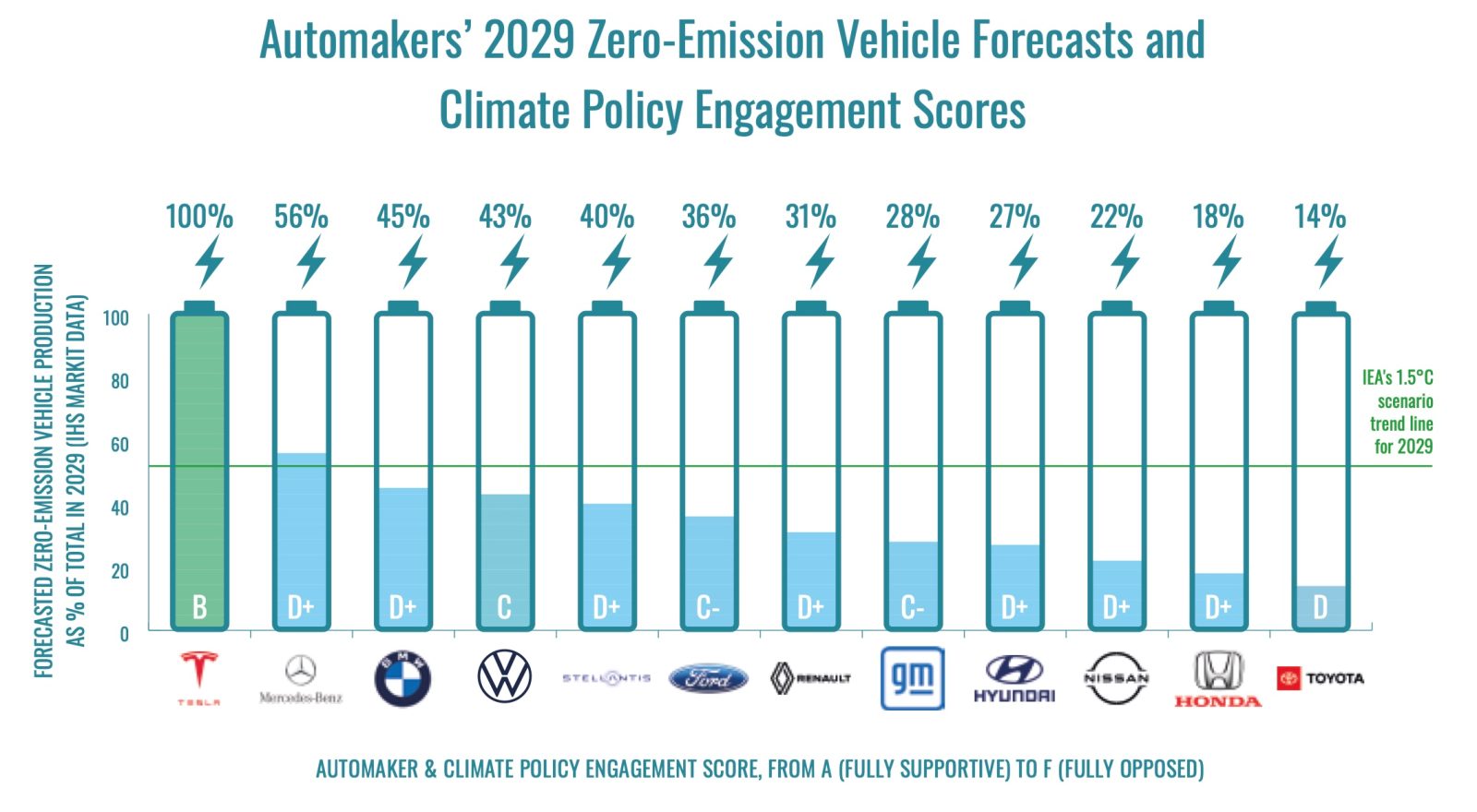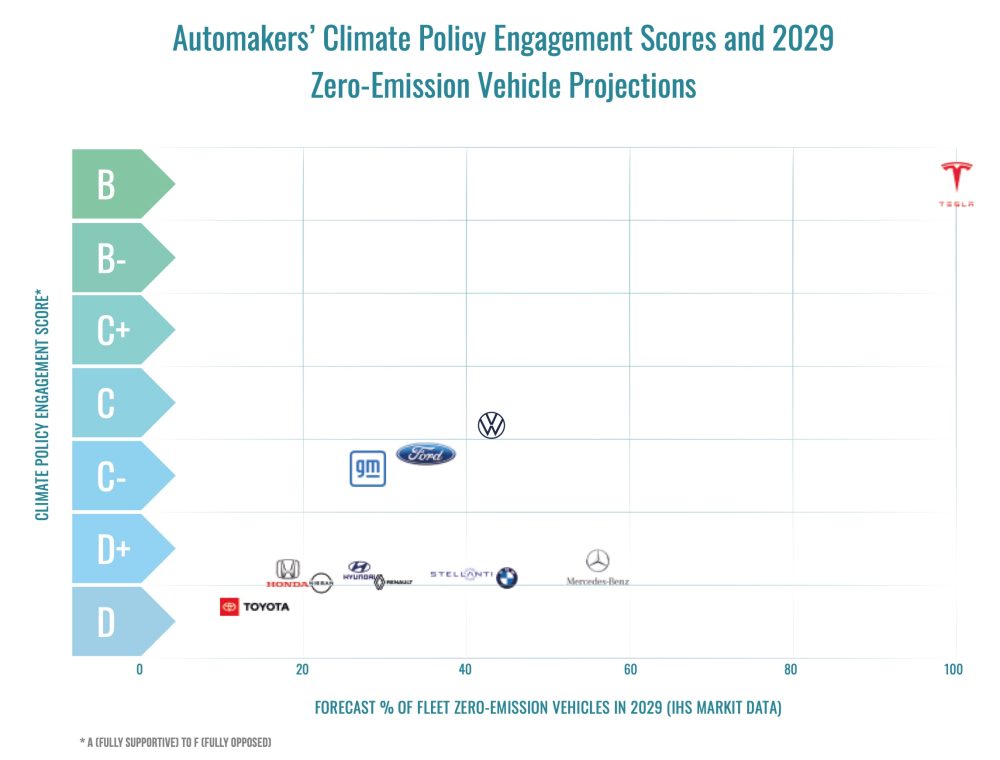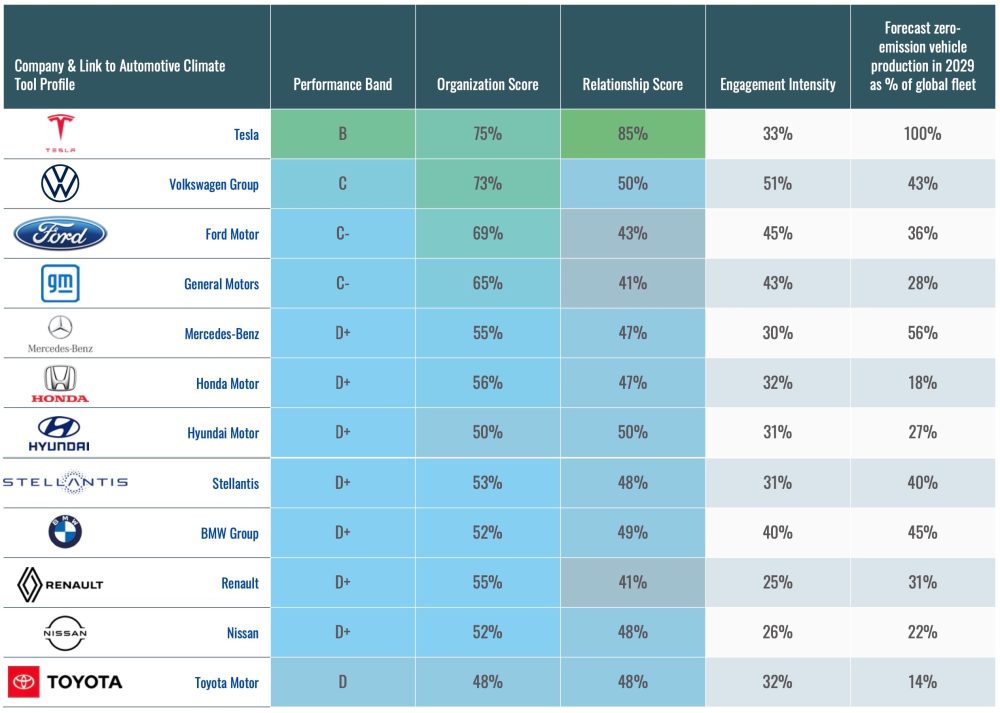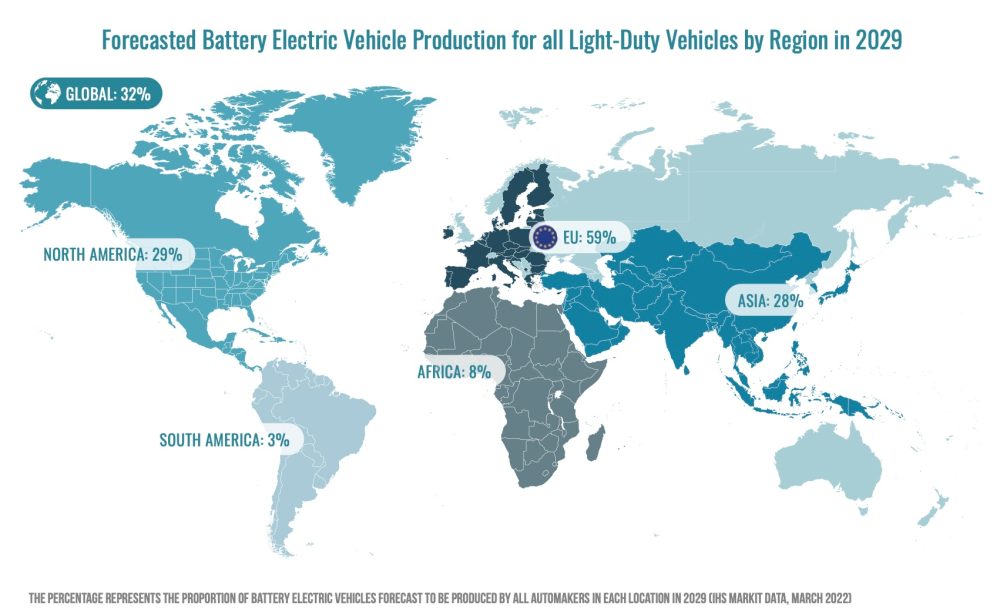
Globally, more than half of all new vehicles coming off of production lines in 2029 would need to be electric for the sector to be compliant with the goal of capping global warming at 1.5 degrees Celsius above preindustrial levels
(AFP/SONNY TUMBELAKA)
Marlowe HOOD
Wed, May 18, 2022,
Only two of the world's 12 top automakers plan to make enough electric vehicles by 2030 to stay in step with Paris Agreement climate goals, experts said Wednesday.
Globally, more than half of all new vehicles coming off of production lines in 2029 would need to be electric for the sector to be compliant with the goal of capping global warming at 1.5 degrees Celsius above preindustrial levels, according to Influence Map, a research NGO that evaluates corporate climate goals and policies.
At the same time, 11 of the 12 carmakers -- while publicly supporting the Paris Agreement -- have actively opposed government policies to accelerate the shift to electric vehicles, especially the phase-out internal combustion engines, Influence Map said.
Japanese auto giants Toyota, Honda and Nissan are especially far off the mark, with non-polluting cars accounting for only 14, 18 and 22 percent, respectively, of their planned production in 2029, the report said.
South Korea's Hyundai, US manufacturer Ford and France's Renault -- with 27, 28 and 31 percent of their global fleets projected to be electric in seven years -- were only marginally more on track.
The standout exception is US-based Tesla, a "pure player" manufacturer that has only ever made electric cars and trucks.
Marlowe HOOD
Wed, May 18, 2022,
Only two of the world's 12 top automakers plan to make enough electric vehicles by 2030 to stay in step with Paris Agreement climate goals, experts said Wednesday.
Globally, more than half of all new vehicles coming off of production lines in 2029 would need to be electric for the sector to be compliant with the goal of capping global warming at 1.5 degrees Celsius above preindustrial levels, according to Influence Map, a research NGO that evaluates corporate climate goals and policies.
At the same time, 11 of the 12 carmakers -- while publicly supporting the Paris Agreement -- have actively opposed government policies to accelerate the shift to electric vehicles, especially the phase-out internal combustion engines, Influence Map said.
Japanese auto giants Toyota, Honda and Nissan are especially far off the mark, with non-polluting cars accounting for only 14, 18 and 22 percent, respectively, of their planned production in 2029, the report said.
South Korea's Hyundai, US manufacturer Ford and France's Renault -- with 27, 28 and 31 percent of their global fleets projected to be electric in seven years -- were only marginally more on track.
The standout exception is US-based Tesla, a "pure player" manufacturer that has only ever made electric cars and trucks.
- Lagging behind -
"Almost all automakers are failing to keep pace with the transition to zero emissions," said Influence Map program Manager Ben Youriev.
"Those lagging the furthest behind are also the most negative when it comes to climate policy advocacy."
Ford, Stellantis, Volkswagen and BMW come closer to the 52 percent threshold for compatibility with Paris temperature target, with 36 to 46 percent of their fleets planned to be electric in 2029.
Besides Tesla, only Mercedes-Benz -- at 56 percent -- is projecting a transition in keeping with that target.
To evaluate automaker trajectories, Influence Map cross-references different datasets.
Researchers used the International Energy Agency's (IEA) scenario for decarbonising the transport sector rapidly enough to not jeopardise the 1.5C goal, which would need 57.5 percent of all cars produced in 2030 to be electric.
The IEA's Net Zero by 2050 report also assumes the share of renewables in global electricity generation would be about 60 percent in 2030.
The Influence Map report then compared this goal with IHS Markit production forecasts to 2029, corresponding to a 52 percent share of electric vehicles in the IEA schema.
Collectively, the combined global production of battery electric vehicles by all automakers is forecast to only reach 32 percent by 2029.
That means the auto industry would need to boost production of zero-emission cars by 80 percent in order to hit the IEA 2030 production target.
- Impact of government policy -
The report findings reveal the critical impact of government policy on the pace of the transition away from internal combustion engines, which account for around 16 percent of global energy-related CO2 emissions, according to the UN's Intergovernmental Panel on Climate Change (IPCC).
In the European Union, which aims to cut greenhouse gas emissions to 55 percent below 1990 levels by 2030, Toyota's produced fleet is projected to be 50 percent electric by 2029.
But in the United States, where fuel emissions standards are less stringent, that figure is only four percent.
Similarly, Ford's EU-based production is forecast to be 65 percent electric by 2029 -- nearly double it's global average.
One pension fund with shares in Toyota and Volkswagen expressed concern about the Influence of the Map findings.
"As investors, we are concerned with the picture painted which confirms that some companies in the auto industry are placing themselves on the wrong side of history when actively opposing much needed climate change-related rules and regulations," Anders Schelde, CIO of Denmark's AkademikerPension, with $20 billion of assets under management, told AFP.
"We are also worried about Toyota scoring worst among peers on climate lobbying as the company is jeopardizing its valuable brand."
mh/pvh
"Almost all automakers are failing to keep pace with the transition to zero emissions," said Influence Map program Manager Ben Youriev.
"Those lagging the furthest behind are also the most negative when it comes to climate policy advocacy."
Ford, Stellantis, Volkswagen and BMW come closer to the 52 percent threshold for compatibility with Paris temperature target, with 36 to 46 percent of their fleets planned to be electric in 2029.
Besides Tesla, only Mercedes-Benz -- at 56 percent -- is projecting a transition in keeping with that target.
To evaluate automaker trajectories, Influence Map cross-references different datasets.
Researchers used the International Energy Agency's (IEA) scenario for decarbonising the transport sector rapidly enough to not jeopardise the 1.5C goal, which would need 57.5 percent of all cars produced in 2030 to be electric.
The IEA's Net Zero by 2050 report also assumes the share of renewables in global electricity generation would be about 60 percent in 2030.
The Influence Map report then compared this goal with IHS Markit production forecasts to 2029, corresponding to a 52 percent share of electric vehicles in the IEA schema.
Collectively, the combined global production of battery electric vehicles by all automakers is forecast to only reach 32 percent by 2029.
That means the auto industry would need to boost production of zero-emission cars by 80 percent in order to hit the IEA 2030 production target.
- Impact of government policy -
The report findings reveal the critical impact of government policy on the pace of the transition away from internal combustion engines, which account for around 16 percent of global energy-related CO2 emissions, according to the UN's Intergovernmental Panel on Climate Change (IPCC).
In the European Union, which aims to cut greenhouse gas emissions to 55 percent below 1990 levels by 2030, Toyota's produced fleet is projected to be 50 percent electric by 2029.
But in the United States, where fuel emissions standards are less stringent, that figure is only four percent.
Similarly, Ford's EU-based production is forecast to be 65 percent electric by 2029 -- nearly double it's global average.
One pension fund with shares in Toyota and Volkswagen expressed concern about the Influence of the Map findings.
"As investors, we are concerned with the picture painted which confirms that some companies in the auto industry are placing themselves on the wrong side of history when actively opposing much needed climate change-related rules and regulations," Anders Schelde, CIO of Denmark's AkademikerPension, with $20 billion of assets under management, told AFP.
"We are also worried about Toyota scoring worst among peers on climate lobbying as the company is jeopardizing its valuable brand."
mh/pvh
Automakers lobbying toward climate catastrophe, production goals won’t meet <1.5C target
Jameson Dow
Electrek
- May. 17th 2022

Major automakers are currently on track to fail to meet necessary climate goals to keep the world under 1.5 degrees Celsius of warming, according to a new report by InfluenceMap.
The report showed that while companies are largely making climate-forward public statements, these statements do not match up with their actions in terms of future production plans or their lobbying efforts.
The report compared production forecasts to the International Energy Agency’s 2050 road map, which detailed that 57.5% of light-duty vehicle sales must be zero-emission by 2030. The report focused on 2029 model year vehicles, as that is the last year before the 2030 timeline.
Per the report, 11 of 12 automakers (excluding Tesla) fall short in terms of future production plans or lobbying efforts. VW was found to have acceptable lobbying efforts but deficient global production plans, while Mercedes’ production plans are good enough but policy advocacy lags behind even US automakers. Current industry production forecasts may even put the world on track to exceed 2 degrees Celsius of warming if more isn’t done to bring them in line with necessary climate goals.
Unsurprisingly, Japanese automakers lag behind the rest, occupying the bottom 3 positions on the table. Nissan is slightly better than Honda and Toyota in this respect but still lags behind all non-Japanese automakers. However, the report, which used data ending March 2022, did not account for Honda’s April announcement of increased EV investment, which could improve its position.
The report noted that most companies tend to embrace and advocate for better climate policy in direct proportion to their future EV production goals, but that a few companies are outliers to this trend. BMW, Stellantis, and Mercedes have all set relatively high targets (but not high enough, except Mercedes) for future production, but their engagement with lobbying efforts has largely been against climate action.
While US automakers are currently doing better in policy advocacy than most others (in a break from the past), US policy is nowhere near what’s required to meet climate targets. As a result, automakers who sell in the US have significantly lower sales targets in the US than elsewhere. For example, Toyota plans 49% BEVs in the EU by 2029, but only 3% in the US. US EV production percentage is projected to be lower than Chinese and EU EV production in 2029.
Automotive industry lobbying groups are further pushing against climate action, and the companies examined (except Tesla) all belong to and actively engage with at least one lobbying group that is actively fighting against regulations on polluting vehicles (represented by each company’s “relationship score”).

Even Tesla had a little room for improvement, earning a “B” for their lobbying efforts. This was largely down to their relative lack of “engagement intensity” on policy issues – while the company does generally lobby in the right direction, there are other companies that lobby significantly harder and more effectively than Tesla does. Regardless, Tesla still stood out from the pack as far and above the best example of an automaker covered by the report (their CEO – who supports climate-harming increases in oil drilling – notwithstanding).
The situation is even worse outside of the major markets of the EU, China, and the US, where automakers have single-digit-percentage EV plans and expect to offload their polluting gas vehicles onto the populations that are generally the most negatively affected by global pollution.

SUV production was found to be a major threat across the industry to decarbonization. Production forecasts show that SUVs will rise from 39% to 47% of light-duty vehicles with all automakers planning to increase SUV production, increasing emissions from light-duty vehicles and eating away at some of the improvements from gradual electrification of the vehicle fleet. SUVs have been the second largest cause of emissions increases globally over the last decade.
Automotive industry lobbying has improved in the last two years that InfluenceMap has looked into this, with most of the industry now earning better scores than they did in 2020. Volkswagen (or should I say Voltswagen?) has shown the most improvement, raising their score from a D- to a C, while Ford and GM have improved significantly as well. This shows that the industry can respond and still improve, but it remains to be seen if that improvement will happen fast enough. Regardless, industry lobbying activities still represent a major blockage to addressing climate change through policy.
Electrek’s Take
These climate goals are necessary to avoid the worst impacts of climate change, including the possibility of positive feedback loops that will only make it harder to bring warming under control. The necessity of keeping warming below 1.5 degrees Celsius is not some political opinion but a result of the projections of thousands of scientists showing that we are at a breakpoint where we can still avoid the worst and costliest effects of climate change.
And there is no way that we can negotiate or lobby our way out of this. In this negotiation, our adversary is physics, and physics does not care about how many dealers you have to wrangle, how many engineers you have to retrain, how many battery recycling plants you need to construct, or any of the other traditional excuses the auto industry has made for their complacency. It only cares that you need to reduce carbon in the atmosphere, and it’s not going to budge or compromise, no matter how hard you lobby it or how difficult you say compliance would be.
We must keep warming underneath these target temperatures. We caused it, we are the only ones who can stop it, so we must get to work.
Simply put, automakers and governments (and consumer demand, see SUVs) must do better than what current production plans and policy indicate, lobbying against progress needs to end, and the industry must take action – today. We have to do more. End of discussion.
Jameson Dow
Electrek
- May. 17th 2022

Major automakers are currently on track to fail to meet necessary climate goals to keep the world under 1.5 degrees Celsius of warming, according to a new report by InfluenceMap.
The report showed that while companies are largely making climate-forward public statements, these statements do not match up with their actions in terms of future production plans or their lobbying efforts.
The report compared production forecasts to the International Energy Agency’s 2050 road map, which detailed that 57.5% of light-duty vehicle sales must be zero-emission by 2030. The report focused on 2029 model year vehicles, as that is the last year before the 2030 timeline.
Per the report, 11 of 12 automakers (excluding Tesla) fall short in terms of future production plans or lobbying efforts. VW was found to have acceptable lobbying efforts but deficient global production plans, while Mercedes’ production plans are good enough but policy advocacy lags behind even US automakers. Current industry production forecasts may even put the world on track to exceed 2 degrees Celsius of warming if more isn’t done to bring them in line with necessary climate goals.
Unsurprisingly, Japanese automakers lag behind the rest, occupying the bottom 3 positions on the table. Nissan is slightly better than Honda and Toyota in this respect but still lags behind all non-Japanese automakers. However, the report, which used data ending March 2022, did not account for Honda’s April announcement of increased EV investment, which could improve its position.
The report noted that most companies tend to embrace and advocate for better climate policy in direct proportion to their future EV production goals, but that a few companies are outliers to this trend. BMW, Stellantis, and Mercedes have all set relatively high targets (but not high enough, except Mercedes) for future production, but their engagement with lobbying efforts has largely been against climate action.

While US automakers are currently doing better in policy advocacy than most others (in a break from the past), US policy is nowhere near what’s required to meet climate targets. As a result, automakers who sell in the US have significantly lower sales targets in the US than elsewhere. For example, Toyota plans 49% BEVs in the EU by 2029, but only 3% in the US. US EV production percentage is projected to be lower than Chinese and EU EV production in 2029.
Automotive industry lobbying groups are further pushing against climate action, and the companies examined (except Tesla) all belong to and actively engage with at least one lobbying group that is actively fighting against regulations on polluting vehicles (represented by each company’s “relationship score”).

Even Tesla had a little room for improvement, earning a “B” for their lobbying efforts. This was largely down to their relative lack of “engagement intensity” on policy issues – while the company does generally lobby in the right direction, there are other companies that lobby significantly harder and more effectively than Tesla does. Regardless, Tesla still stood out from the pack as far and above the best example of an automaker covered by the report (their CEO – who supports climate-harming increases in oil drilling – notwithstanding).
The situation is even worse outside of the major markets of the EU, China, and the US, where automakers have single-digit-percentage EV plans and expect to offload their polluting gas vehicles onto the populations that are generally the most negatively affected by global pollution.

SUV production was found to be a major threat across the industry to decarbonization. Production forecasts show that SUVs will rise from 39% to 47% of light-duty vehicles with all automakers planning to increase SUV production, increasing emissions from light-duty vehicles and eating away at some of the improvements from gradual electrification of the vehicle fleet. SUVs have been the second largest cause of emissions increases globally over the last decade.
Automotive industry lobbying has improved in the last two years that InfluenceMap has looked into this, with most of the industry now earning better scores than they did in 2020. Volkswagen (or should I say Voltswagen?) has shown the most improvement, raising their score from a D- to a C, while Ford and GM have improved significantly as well. This shows that the industry can respond and still improve, but it remains to be seen if that improvement will happen fast enough. Regardless, industry lobbying activities still represent a major blockage to addressing climate change through policy.
Electrek’s Take
These climate goals are necessary to avoid the worst impacts of climate change, including the possibility of positive feedback loops that will only make it harder to bring warming under control. The necessity of keeping warming below 1.5 degrees Celsius is not some political opinion but a result of the projections of thousands of scientists showing that we are at a breakpoint where we can still avoid the worst and costliest effects of climate change.
And there is no way that we can negotiate or lobby our way out of this. In this negotiation, our adversary is physics, and physics does not care about how many dealers you have to wrangle, how many engineers you have to retrain, how many battery recycling plants you need to construct, or any of the other traditional excuses the auto industry has made for their complacency. It only cares that you need to reduce carbon in the atmosphere, and it’s not going to budge or compromise, no matter how hard you lobby it or how difficult you say compliance would be.
We must keep warming underneath these target temperatures. We caused it, we are the only ones who can stop it, so we must get to work.
Simply put, automakers and governments (and consumer demand, see SUVs) must do better than what current production plans and policy indicate, lobbying against progress needs to end, and the industry must take action – today. We have to do more. End of discussion.
.png)
No comments:
Post a Comment